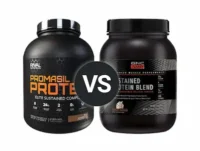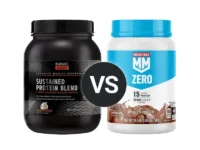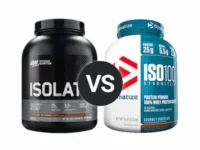Knowledge BaseYou're Questions Answered
Can protein powder cause a positive drug test for banned substances?
Protein powders can cause a positive drug test for banned substances, but this is relatively rare and usually due to contamination or mislabeling rather than the protein powder itself inherently containing illegal drugs. Athletes and others subject to drug testing should be cautious about the supplements they use.
Several factors can lead to the presence of banned substances in protein powders:
- Contamination during manufacturing: If the equipment used to make protein powders is also used to process other supplements that contain banned substances, cross-contamination can occur. This is particularly a risk with manufacturers that do not follow Good Manufacturing Practices (GMP) (1).
- Mislabeling: Some products may not accurately disclose all ingredients, either unintentionally due to poor quality control or intentionally to hide the inclusion of performance-enhancing substances that can cause a positive drug test (2).
- Presence of prohormones or steroids: Some protein powders, especially those marketed as helping to increase muscle mass, may contain prohormones or steroids that are not listed on the label. These substances can lead to positive tests for banned androgens (3).
To minimize the risk of failing a drug test due to contaminated supplements, it is recommended to:
- Choose protein powders that are certified by third-party organizations such as NSF Certified for Sport or Informed Sport. These products have been tested to ensure they are free from banned substances (4).
- Check the reputation of the manufacturer, including looking for any history of FDA warnings against products made by the company (5).
- Review and understand the list of banned substances provided by the relevant sports authorities to ensure no ingredient is a known banned substance.
If you test positive on a drug test and suspect that a contaminated supplement is the cause, it is important to provide the batch number and purchase information of the product to the testing authorities. This can assist in investigating the source of contamination and potentially exonerate the individual from doping allegations (6).
- Kamber, M., Baume, N., Saugy, M., & Rivier, L. (2001). Nutritional supplements as a source for positive doping cases? International Journal of Sport Nutrition and Exercise Metabolism, 11, 258-263.
- Abernethy, D. R., & Schumacher, C. (2010). Globalization of Herbal Supplements: From Traditional Medicine to Neutraceuticals. Journal of Alternative and Complementary Medicine, 16(3), 258-263.
- Van Thuyne, W., & Delbeke, F. T. (2006). Distribution of androgenic anabolic steroids in doping control analysis. Forensic Science International, 157, 142-155.
- NSF International. (2022). NSF Certified for Sport®.
- U.S. Food and Drug Administration. (2019). Tainted Products Marketed as Dietary Supplements.
- Sottas, P.-E., Robinson, N., Rabin, O., & Saugy, M. (2011). The athlete biological passport. Clinical Chemistry, 57(7), 969-976.
Related Questions
Related Reviews
Your Answer
We are a participant in the Amazon Services LLC Associates Program, an affiliate advertising program designed to provide a means for us to earn fees by linking to Amazon.com and affiliated sites.



